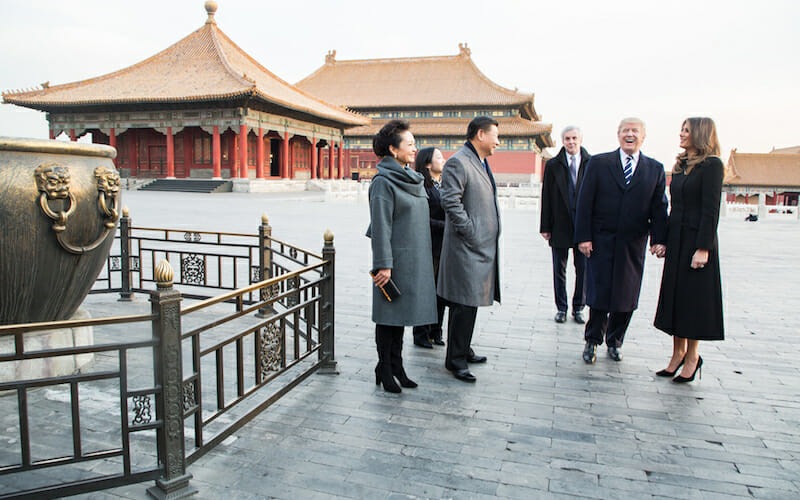
Before the Devil Turned Around
President Trump managed to seal two deals during his first state visit to China. The first was a dazzling $250 billion trade agreements with China. Yet, the second deal was a pyrrhic victory.
When Trump learned that three UCLA basketball players were arrested in China for shoplifting, he bailed them out while having dinner with the Chinese leader. It was swiftly taken care of to the satisfaction of all parties: China did the Americans a favor and the US president put another feather in his cap as the three delinquents would walk away with impunity.
Just as in reality shows, feuds boost ratings. When LaVar Ball, the “ungrateful” father of one player, denied acknowledging Trump the credit for their release, the president commented: “I should have left them in jail.” In this case, although these three kids did not exercise good judgment, adults also failed to exercising discretion. Justice should have been allowed to run its course, Acquittal should have only been granted by, and only by, the rule of law. However, the law was circumvented.
The current international order takes its roots in the Anglo-American custom of the rule of law. A.V. Dicey, the author of An Introduction to the Study of the Law of the Constitution, gave three-fold meanings to the rule of law. By cross-examining his definitions with the case at hand, we shall see why this incident could be the thin end of the wedge.
Dicey’s first thought is that any punishment must be “for a proven breach of the established law of the land.” The charge levied against these three freshman players was that they stole designer sunglasses at a shopping mall next to their hotel. The breach was “proven” because the local police retrieved the stolen objects in their rooms, and all three admitted guilt on record and publicly. By “established law,” the breach is not arbitrary in that stealing merchandise worth over a designated amount is a felony. And the local court “of the land” has unquestionable jurisdiction. This is an open-and-shut case. When the indefensible is defended a principle is at stake.
Now that the three basketball players are out of China and saved from years in jail, LaVar Ball, the father of LiAngelo, is unaccepting of what I did for his son and that shoplifting is no big deal. I should have left them in jail!
— Donald J. Trump (@realDonaldTrump) November 19, 2017
This principle is enshrined in the second meaning of Dicey’s definition: “no one is above the law.” Since 1945, the U.S. has pursued its national interests by creating a framework of liberal political and economic rules, maintaining a network of international organizations and regulations, and enforcing a mechanism of regional and collective security. The categorical difference between the previous laws of the jungle and those of this new international order is that the strong respects the rights of the weak. Fairness lends strength to effectiveness. This system has ushered in a new era of unprecedented and undisrupted decades of peace and prosperity for all nations. Perhaps no nation has revered the rule of law more dearly than has America. When other nations sought independence, they declared wars. When America sought independence, it declared laws. Tom Paine stated the best footnote to this unique American experience: “In America, the Law is King.”
Some may share LaVar Ball’s opinion that this is nothing but an insignificant case, better hushed up than blown up. Following this logic, decision-makers will soon trivialize matters. Before long they would be in the profitable business of triaging matters according to their own preferences and eventually might consider it more convenient to usurp judicial power. Thus, Dicey’s third and last meaning rings out: the spirit of the rule of law lies in “a slow, incremental process of common law decision making, judge by judge, case by case.” This aphorism reveals the reversible process of both making and unmaking the rule of law. If the powerful are allowed to bend the law at will, law will renounce its sovereign power. The past decade has witnessed a series of such cases: the decision of the George W. Bush’s administration to invade Iraq under a disputed UN authorization, the failure to close the Guantanamo Bay detention facility where prisoners are held for an indefinite period of time without a trial, or the exposure by Edward Snowden’s massive surveillance programs with the cooperation from telecommunication carriers. Now after a decade of case-by-case erosions of the power of the rule of law, the U.S. hegemony is facing a legitimacy challenge.
Will the American-designed international order meet its end in this century? This question is open to debate. But one thing is for certain: the days of hypocrisy are over. One way or another, America must align its policy with its rhetoric. The easy way out would be to forgo lofty words and pursue narrow self-interests. Yet, this road leads back to an old interpretation, where the ruins of dead empires lie. The alternative would be to pursue actions that are more compatible with its rhetoric. This road points to a new direction, along which some Americans have already laid down the foundations for an international order governed by the rule of law — Woodrow Wilson’s vision was translated into the League of Nations, the Kellogg-Briand Pact morphed into the United Nations Charter, and the First Lady Eleanor Roosevelt’s legacy was inscribed into the Universal Declaration of Human Rights.
Following in their footsteps, a new international order has been founded by the rule of law, where nations were emancipated from the raison d’état, and the U.S. shone as a beacon of liberty and justice to the rest of the world. Without exaggeration, the spirit of the rule of law was the fountain or façade of the U.S. strength in the international arena. However, after a decade of wars on terror, we have witnessed the chipping away of this strength. The reason is that, in a fight between good and evil, it is easy to lose the moral bearing when many courses of action often point to contradictory policies. At such a juncture, the compass of law is the only sure guide that points to a moral right.
In A Man for All Seasons, when Thomas More heard that Roper would fight the Devil at the expense of the law, he answered, “And when the last law was down, and the Devil turned round on you—where would you hide, Roper, the laws all being flat?” In a word, what should trouble the public and the mainstream media is not Trump’s impatient willingness to break bureaucratic rules to “make America great again,” but his disregard for the law may come from the confidence of personally as he appears to believe that he is immune to everything. Let us cross our fingers that when he dines with leaders, he does not drink from the same cup.

